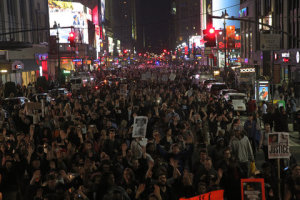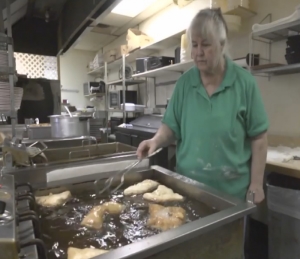Podcast: Play in new window | Download
Updates:
- Hosts Discuss Mass Demonstrations In Wake Of Ferguson Grand Jury Verdict
—-
Mumia Abu Jamal Responds To Grand Jury Not Indicting Ferguson Police Officer Darren Wilson
We talk today about the wide scale pattern of police violence against people of color in the context of the grand jury decision in St. Louis, Missouri to not indict Ferguson police officer Darren Wilson for the fatal shooting of Michael Brown, an unarmed 18 year old African American. The decision sparked more outrage within the community of Ferguson and launched tens of thousands into the streets in cities across the country. The grand jury is comprised of 12 members and 10 out of the 12 would have to agree to indict. The grand jury had a number of choices, such as first degree murder, second degree murder, voluntary manslaughter or involuntary manslaughter. First degree murder would have required evidence that Wilson set out to kill Brown. Second degree murder charges were possible, but this choice was unlikely if jurors decided that Wilson was negligent when he shot Brown, they could have gone with a charge of voluntary or involuntary manslaughter.
- When you think back through American history, there are actually few periods where you see this range of protest.
- You’ll see throughout the 20th century protest. Think about April 4, 1968, the day Martin Luther King Jr. was killed and you saw protests all across the country over hundred cities.
- And look what happened a few hours ago, perhaps a greater range of protest in over 170 cities tells you I think better than anything I can say, that things are very bad indeed for the African American community and their expectation of justice in this system.
- Think about the weather, people coming out in the dire cold, right, to protest at night. That’s not an easy thing, people don’t do that easily and they do it at considerable risk and some danger.
- That speaks to the depth of the feeling in their hearts that something is broken in the American justice system.
- The recent midterm election was the lowest turnout since the 1940s. That says something about American discontent with the political system.
- It actually reminds me about the demonstrations before the 2003 Iraq War, where all around the world in hundreds of countries you saw demonstrations that were unprecedented.
- People feel that. Now that can dissipate until a new provocation.
- This is the time where organizers should be on their p’s and q’s and out there taking phone numbers and taking emails and building lists.
- To stand up at this moment, the first African American president in America’s history and talk about that people need to observe and respect the rule of law is I think frankly absurd.
- Barack Hussein Obama was born August 4, 1961. In that year there were about 20 states that made it illegal for a white person to marry a black person.
- People went to jail for what they called interracial fornication.
- When you talk about the rule of law, you have to talk about the rule of right and the rule of wrong.
- To quote John Africa, who said just cause its legal don’t make it right.
- We live in a country that legalized slavery.
- Many things are done in the name of law, but they’re wrong, they’re simply wrong.
- I was reading in the USA Today last week, (I’m little behind in my reading) they said 461 people were killed by police in 2013.
- This is something that’s systemic in the United States, and the people are trying to draw attention and I don’t think its successful, but its a damn good beginning.
Guest – Mumia Abu-Jamal is a renowned journalist from Philadelphia who has been in prison since 1981 and was on death row since 1983 for allegedly shooting Philadelphia police officer Daniel Faulkner. After decades of appeals, he left death row in 2012 but is still facing a life sentence. He is known as the “Voice of the Voiceless” for his award-winning reporting on police/state violence brutality and other social and racial epidemics that plague communities of color in Philadelphia and throughout the world.
—-
Civil Forfeiture: Federal Government Seizes Property Of Business Owners
In May of 2013, two Internal Revenue Service agents seized the checking account of Carole Hinders and the 32 thousand dollar balance. Hinders was accuses of structuring her deposits to be less than 10 thousand dollars to avoid filing required government reports. This is a tactic often used by drug dealers and other criminals to move money around without detection. However, Carl Hinders owns a Mexican restaurant and her business is cash only. She did explain to the IRS agents that she made deposits almost daily to avoid having thousands of cash on hand. Hinders wasn’t charged with a crime, yet the IRS still seized the money. There are many cases of civil forfeiture similar to Carol’s where the property is taken without proper due process and investigation.
- Civil forfeiture is a set of laws that allow government agencies to take your property when they suspect its been involved in crime but they don’t need to charge you with any crime to take that property.
- One of the incredible things about civil forfeiture is that the agencies that seize your money based on a mere suspicion actually get to keep that money to fund their agencies.
- That’s true in most states and also for the federal law.
- Every state is engaged in civil forfeiture. Minnesota had a reform. They no longer use strictly civil forfeiture, they’ll only take your property after you’ve been convicted of a criminal offense.
- The federal government uses it (civil forfeiture) almost every major agency of the federal government, the Drug Enforcement Administration, the IRS, the DHS, ICE.
- You can’t have both civil forfeiture and an impartial enforcement of the law if the agencies enforcing that law get the money.
- In federal cases there’s another lack of due process. The federal agencies seize cash like a bank account, the law doesn’t provide any prompt post seizure hearings. So, there’s no right for you to quickly contest the validity of the seizure. You might wait a hear without your money before you get to see a judge.
- It’s very hard to get it back because it means mounting a full scale defense in state or federal court against well funded prosecutors.
- There’s that financial incentive, so the government is doing more and more of these civil forfeitures as their budgets are coming under constraint.
- If local law enforcement involves themselves in a federal forfeiture action, they’ll get paid a bounty by the feds for their participation. That becomes a very meaningful part of police department budgets.
- That equitable sharing program has ballooned from nothing to something over 450 million dollars a year given to local police departments.
- We’re seeing it again with another set of clients. We have 3 brothers who own a convenient store distribution business on Long Island, the IRS again took 446 thousand dollars from them.
- This is a modest business almost all of that money was money that was owed to vendors for inventory. They grabbed their bank account when it was its fullest basically. The allegation again was structuring.
- There’s not even a civil forfeiture action that’s been filed, that’s a violation of law in itself the government’s committed.
- Many of the worst aspects of civil forfeiture were ushered in on the premise that they were needed to combat drug trafficking but now we see civil forfeiture being used to treat legitimate small businesses like criminals, just because they’re making frequent cash deposits.
Guest – Attorney Larry Salzman is with the Institute for Justice. He joined the Institute in April 2011 and litigates cutting-edge constitutional cases protecting individual rights, including free speech, property rights, and economic liberties, in federal and state courts. He is originally from San Diego. His commitment to both entrepreneurship and law is reflected in his career prior to joining IJ. Larry co-founded an ecommerce company with his family in 2000, while attending law school at night, and returned to the business for several years as CEO upon its sale in 2007. During the interim, he was an attorney with Pacific Legal Foundation, in Sacramento, California, litigating property rights cases in federal and state courts, and served as a clerk to Judge Bohdan A. Futey on the United States Court of Federal Claims. Larry received his law degree in 2002 from the University of San Diego, where he was Assistant Editor of the San Diego Law Review. He received an undergraduate degree in Finance from Arizona State University in 1993.
——————————————————————————————————————————–



